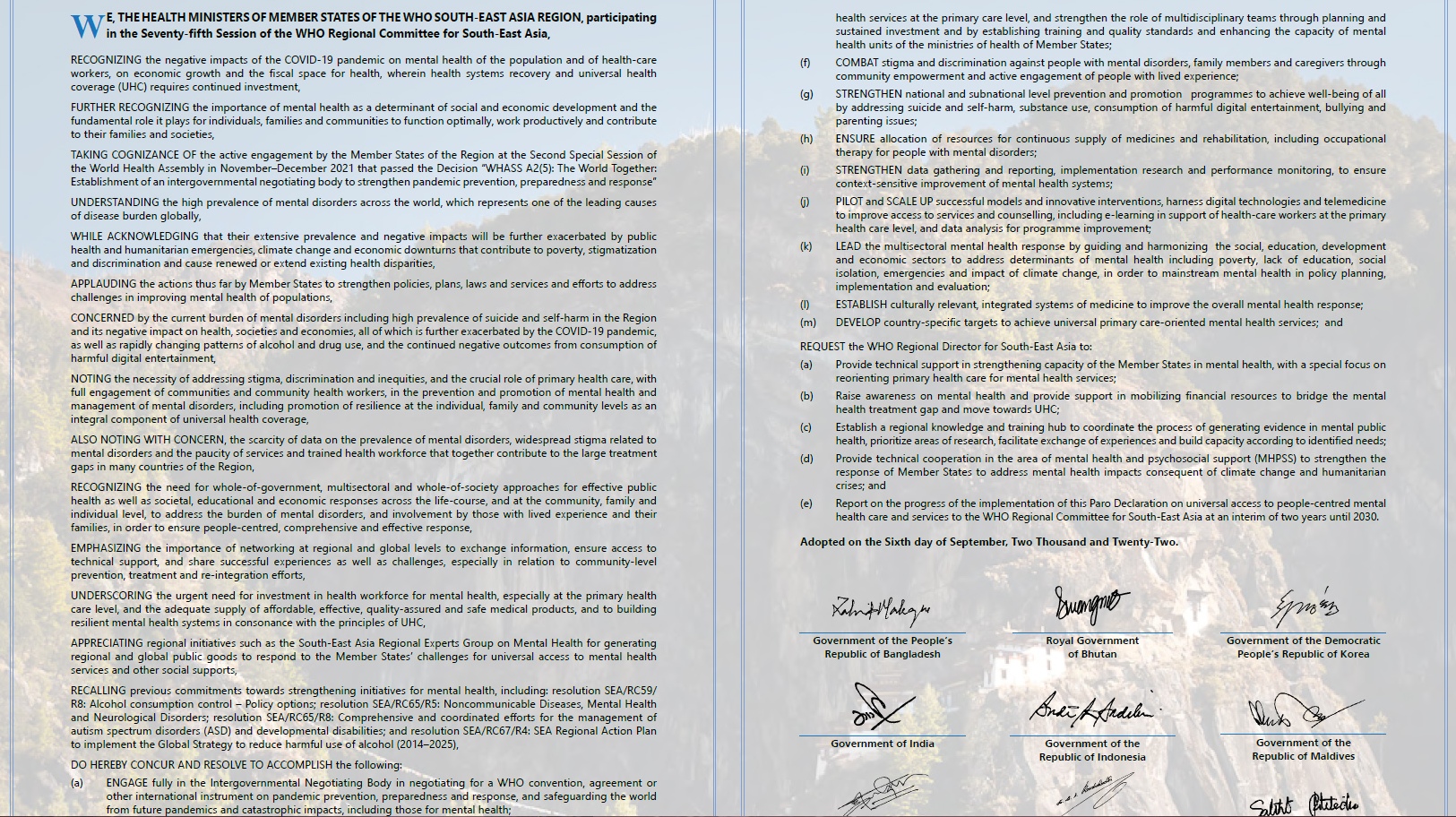 The Paro Declaration by health ministers of the WHO regional committee for South-East Asia, signed in September 2022.
The Paro Declaration by health ministers of the WHO regional committee for South-East Asia, signed in September 2022.
[This article is from The Round Table: The Commonwealth Journal of International Affairs.]
The mental health of people in South Asia is an essential aspect of their life. It is becoming increasingly a matter of concern, with many people experiencing problems like depression, anxiety, and addiction. Studies have shown that South Asia has a higher rate of mental illness than many other regions of the world. Inappropriate knowledge and mental health stigma make it hard for people to seek help and to get proper treatment. Mental health services are also often not good enough or easy to get because there are insufficient trained professionals and resources are scarce.
Almost 23% of the world’s population lives in eight South Asian countries. All these countries share many similarities in living and development standards. All the South Asian countries suffer from an inadequate supply of appropriate medical facilities, primarily attributable to the region’s high population density. South Asia has a wide range of contrasts. This region has experienced substantial social and economic transformations in the last few decades. Mental, neurological, and drug use problems account for most of the disease burden in South Asian countries. The population of South Asia is multicultural, religious, and socioeconomically heterogeneous; it is also growing too fast. However, few studies have estimated the prevalence and burden of this region’s psychiatric disorders.
Recently, the World Health Organisation (WHO) reported that, according to the national health surveys of India and Nepal, the overall weighted prevalence of mental morbidity in adults was very high. At the same time, in other countries, such as Bhutan, Sri Lanka, and Maldives, there are no national estimates of the prevalence of mental disorders, epilepsy, other neurological disorders, nor information about the availability of mental health services. Only four countries have national mental health policies: India, Pakistan, Nepal, and Bhutan. Apart from India (1982 policy), the others developed as late as in the late 1990s. Most countries elsewhere have national mental health programmes. Some have integrated mental health with the general health delivery system.
The Paro Declaration
Climate change and the increasing vulnerability of the poor in the Commonwealth – 2021
Malaysia, Myanmar and Singapore: common threads, divergences, and lessons learned in responding to the COVID-19 pandemic – 2021
Based on the national health surveys in India and Nepal, WHO reports that the lifetime prevalence of mental morbidity is 13.7% in India and 10% in Nepal. In recent years, the centralisation of the mental health delivery system has suffered a significant setback, and the focus has shifted to community care rather than the establishment of new mental asylums. To promote mental health in the region, the WHO South Asia Region Member States adopted the Paro Declaration, committing themselves to universal access to care and services centred on the person.
In many South Asian communities, mental health is stigmatised, and symptoms are frequently disregarded due to a lack of education and awareness. Owing to the stigma associated with mental illness, South Asians frequently suffer in silence. South Asian countries have encountered specific difficulties in responding to the global psychosocial repercussions of COVID-19. Some research has linked COVID-19 and the lockdowns to an increase in cases of psychological disorders among the general population. The symptoms for such disorders include withdrawal from social activities, vulnerability to false information, anxiety about contracting an infection, and difficulty in sleeping.
It is a crying need of the hour that all South Asian governments should improve mental health services. WHO recently announced a ‘Mental Health Gap Action Programme’ (MHGAP). Its goal is to help more people with mental and psychological disorders in low-middle-income countries. The MHGAP presented a framework to people who are not experts on how to help people with mental health. Mental health is still a common topic of conversation in the most popular forums and platforms in the 21st century. ‘There is no health without mental health’, says the World Health Organisation. Because of this, we should rethink mental health as a top priority.
Shraddha Tripathi is the Assistant Professor, Department of Psychology, Manipal University Jaipur, Rajasthan, India.



